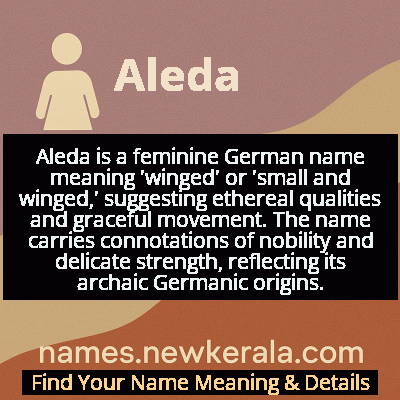Aleda Name Meaning & Details
Origin, Popularity, Numerology Analysis & Name Meaning of Aleda
Discover the origin, meaning, and cultural significance of the name ALEDA. Delve into its historical roots and explore the lasting impact it has had on communities and traditions.
Name
Aleda
Gender
Female
Origin
German
Lucky Number
5
Meaning of the Name - Aleda
Aleda is a feminine German name meaning 'winged' or 'small and winged,' suggesting ethereal qualities and graceful movement. The name carries connotations of nobility and delicate strength, reflecting its archaic Germanic origins.
Aleda - Complete Numerology Analysis
Your Numerology Number
Based on Pythagorean Numerology System
Ruling Planet
Mercury
Positive Nature
Adventurous, dynamic, curious, and social.
Negative Traits
Restless, impatient, inconsistent, prone to indulgence.
Lucky Colours
Green, white.
Lucky Days
Wednesday.
Lucky Stones
Emerald.
Harmony Numbers
1, 3, 9.
Best Suited Professions
Sales, marketing, travel, entertainment.
What People Like About You
Versatility, charisma, adventurous spirit.
Famous People Named Aleda
Aleda Ester Lutz
Military Nurse
Highly decorated flight nurse who evacuated over 3,500 wounded soldiers and died in service
Aleda Shirley
Poet and Author
American poet known for collections like 'Dark Familiar' and contributions to literary journals
Aleda Ann Parker
Educator and Community Leader
Pioneering educator who established schools in rural communities
Name Variations & International Equivalents
Click on blue names to explore their detailed meanings. Gray names with will be available soon.
Cultural & Historical Significance
The name's cultural significance extends beyond its historical usage to represent a connection to Germanic heritage and the preservation of traditional naming practices. In contemporary contexts, Aleda serves as a reminder of the rich tapestry of German linguistic history and the evolution of feminine names across centuries. Its archaic nature makes it a symbol of cultural continuity and the enduring appeal of names that carry historical weight and ancestral connections, particularly for families seeking to honor their German roots while choosing distinctive names for their children.
Extended Personality Analysis
Women named Aleda are often characterized by their refined elegance and intellectual depth, qualities that seem to resonate with the name's archaic German origins. They typically possess a quiet confidence and thoughtful demeanor, approaching life with a measured grace that sets them apart. Their connection to a historically significant name often fosters a strong sense of identity and appreciation for tradition, making them natural preservers of family history and cultural knowledge. Aledas tend to be observant and perceptive, with an ability to understand complex situations and people's motivations.
In social settings, Aledas often exhibit a blend of traditional values and modern perspectives, making them excellent mediators and counselors. They value authenticity and depth in relationships, preferring meaningful connections over casual acquaintances. Their creative talents frequently manifest in artistic pursuits, writing, or musical expression, often with a nostalgic or historical theme. The combination of their name's historical weight and their personal qualities creates individuals who bridge past and present, offering wisdom and stability to those around them while maintaining a forward-looking vision for their own lives and communities.
Modern Usage & Popularity
In contemporary naming practices, Aleda remains an exceptionally rare choice, consistently ranking outside the top 1000 names in English-speaking countries and seeing minimal usage in German-speaking regions. Its primary modern appeal lies with parents seeking distinctive archaic names with strong historical connections, particularly those with German heritage who wish to honor their ancestry. The name occasionally surfaces in historical fiction and genealogical research, but its practical usage is limited to a small number of families each year. Recent trends favoring vintage and uncommon names have generated some renewed interest, though it remains far from mainstream adoption. Most modern Aledas are born to parents who specifically seek names that are both elegant and unique, valuing the name's historical depth and sophisticated sound while accepting its challenges in terms of pronunciation and recognition in daily life.
Symbolic & Spiritual Meanings
Symbolically, Aleda represents the enduring power of heritage and the graceful passage of tradition through generations. The name evokes images of ancestral wisdom, cultural continuity, and the quiet strength that persists across centuries. Metaphorically, it suggests wings—both as instruments of flight toward higher understanding and as protective coverings that shelter valuable traditions. Aleda symbolizes the bridge between historical consciousness and contemporary life, embodying the idea that some qualities remain eternally relevant despite changing times. The name carries connotations of elegance that withstands fashion, wisdom that transcends generations, and identity rooted in cultural memory. It represents the preservation of beauty and meaning from the past, adapted to serve the present while honoring those who carried the name before.

